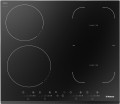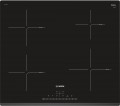Bridge mode
A function that allows you to combine two (or more) adjacent electric hotplates into one burner. Often, this mode is found in induction hobs, less often in Hi-Light, and is not used in gas hobs. Often the "bridge" looks like one continuous heater of an elongated shape, the individual parts of which can be turned on independently and are separate burners. Anyway,
the bridge mode (Bridge) can be useful primarily for working with elongated utensils — for example,
goose roasters. In addition, the design may provide various additional functions — for example, the ability to set different power settings for different parts of the "bridge" and move the dishes between them depending on the readiness of the dish. At the same time, unlike conventional burners, the heating will turn on automatically, according to the presence of dishes on the burner.
Burners power
Nominal burners power. It refers to the power consumption of the heater. This parameter allows you to estimate how much electricity the burners will spend when operating at maximum heating intensity. At the same time, the heat transfer power of different burners can be different, and the actual heating efficiency will also greatly depend on the specs of the dishes. As a result, it hardly makes sense to evaluate the working capabilities of the hob by the power of the burners. It is quite possible to proceed from the fact that the burner will be enough for a pot of the same diameter.
Burner diameter
The heating power directly depends on the diameter of the burners. And, at the same time, the performance of the device and the speed of cooking. The larger the burner, the more heat dissipation it has. Also, the diameter of the burner allows you to determine what sizes of dishes are suitable for use on the hob. Indeed, for induction models, this value is critical for high-quality heating. Burners can have the following diameter:
- small — about 145 mm, power within 1200 W;
- medium — about 180 mm, power within 1700 W;
- large — about 220 mm and more, power within 2000 watts.
Some hobs use double ring burners that allow you to adjust the diameter of the heating zone. If the diameter of the burner is 180, 200, 220 mm, then it means that the heating zone on a particular burner can be narrowed or expanded, depending on the size of the dishes used.
Controls
The type of control used in the hob. The options might be:
—
Rotary knobs. Control based on classic rotary knobs. Sometimes buttons are also provided in the design but they are only responsible for the additional functions of the device. It is the knobs that control the switching on and power of the burners (and the combination of knobs and youch controls is indicated separately — see below). This type of control is known for its simplicity, convenience, reliability and low cost, which make it extremely popular — it is used in most modern hobs of an independent type (see above).
—
Touch controls. touch controls can control almost all functions of the hob, while the set of such functions can be very extensive. Among the advantages of touch sensors, one can note a stylish appearance, ease of cleaning due to the absence of protruding parts, and the touch controls do not need to be pressed — a light touch is enough. The main disadvantage of this type of control is its high cost, but it is mainly used in high-end hobs, where the price of touch controls is almost invisible compared to the cost of the entire device.
— Rotary knobs + touch controls. Combination of rotary knobs (see above) with touch controls. Note that only rotary knobs are enough for basic control of the burners, and buttons can also be used for additional functions — they are cheaper than touch controls. Therefore, t
...his type of control usually means that we have a rather expensive model with an abundance of additional functions. Among the advantages of touch controls, one can note a neat and stylish appearance, as well as ease of cleaning — they, unlike buttons, do not have slots and protruding parts where dirt can accumulate. And some models with similar controls have a rather unusual design — for example, only one rotary knob, the purpose of which is changed by commands from the touch controls.
— Touch + magnetic disk. Touch controls (see above), supplemented by a special rotary control — a magnetic disk. This disc is somewhat similar to rotary knobs, but it is called magnetic because of the fastening — with a permanent magnet, which allows you to remove the control. Most often, there is one disc for all burners; less often there are models with their disc for each burner. However, such a regulator has two key differences from rotary knobs. Firstly, the magnetic disk controls not only the power but most of the other functions of the hob. Secondly, the discs look neater and are more comfortable to use: they spin easily, and the detachable design makes them easy to clean and keeps children out of the way. However, it makes sense to use this control method mainly in high-end hobs with an abundance of functions.
— On the oven. As the name implies, such hobs do not have their control — it is carried out from the oven control panel to which the device is connected. This variant, by definition, only occurs in dependent models (see "Type").
— Slider. A kind of touch controls. Often they are elongated in a slender line; less often they are made in the shape of a circle. To adjust the heating intensity of the burners or quickly access other settings of the hob, slide your finger along the corresponding touch scale to the selected value. The convenience of slider control is that you can immediately set the required heating power by clicking on a certain area of the scale.
— Separate. Control using sensors or sliders (see the corresponding paragraphs), which implies the ability to fine-tune the operation of the burners individually - each of them has its own power adjustment scale. Separate control allows you to set the required heating level for a specific zone without having to first select a specific burner by tapping on the panel. It is more intuitive and gives you more flexibility when preparing different dishes overnight.Number of power levels
The number of temperature settings of the burner. The more power levels, the more accurately you can set the required temperature for cooking a particular dish. However, in most cases, nine levels are enough for home use. But, if you are a gourmet and often cook unusual dishes that require strict adherence to the recipe, then you simply need more temperature settings.
Automatic programmes
—
Boil detection. A system based on a sensor that monitors the state of the product being cooked (usually by the temperature of the dishes): before the water boils, the burner operates at maximum, and after boiling, the sensor reduces the intensity of work to a certain value. The point of this adjustment is that much less heat is needed to maintain the boil than to heat it up to the boiling point; moreover, if you do not reduce the heat, the liquid can spill. Accordingly, automatic boiling allows not only to save energy but also to avoid such troubles. This function is found in electric models (see Product type).
—
Keep warm function. The keep warm function keeps food warm until served. It will come in handy in cases where dinner is already cooked and the guests have not yet arrived. The maximum time for keeping heat usually does not exceed 1-2 hours.
—
Melting. Special mode for low-temperature thawing of small portions of frozen food, melting butter or chocolate. The function allows you to carefully melt the necessary ingredients into a mass of a homogeneous structure without fear that they will burn or overheat.
—
Auto fry function. The pre-set automatic frying mode, which ensures that the temperature of the bottom of the dishes is maintained at the optimum temperature, preventing it from cooling down or over
...heating. An auto fry programme usually provides several cooking modes for different tasks.
— Additional. Several specific auto-programmes used in individual hobs and not covered by the list above.
Power limit
A safety feature that prevents possible problems with old wiring that is not designed for the power consumption of the hob.
The power limit protects the electrical network from a short circuit or burnout of the wiring, and the function will also be useful when working simultaneously with the other household appliances.
Dimensions (WxD)
General dimensions of the device in width and depth. Depth, in this case, refers to the distance from the leading edge to the trailing edge (when viewed from the user's side). Note that the external dimensions of the hobs are often larger than the dimensions for embedding (see below).
Country of origin
The country in which, according to the manufacturer, this or that model is manufactured. Despite the fact that most of the manufacturers are concentrated
in China, European factories for the production of household appliances have not disappeared. And certain models can be produced on them. In general, such a division into a Chinese or European plant should not particularly affect the quality of products, but still the stereotype of a reliable European assembly (
Germany,
Spain,
Italy,
Poland,
Turkey) is present in us. However, it is possible that the model may have a country of manufacture, for example, Poland, and in the store under the same article you will meet China.

